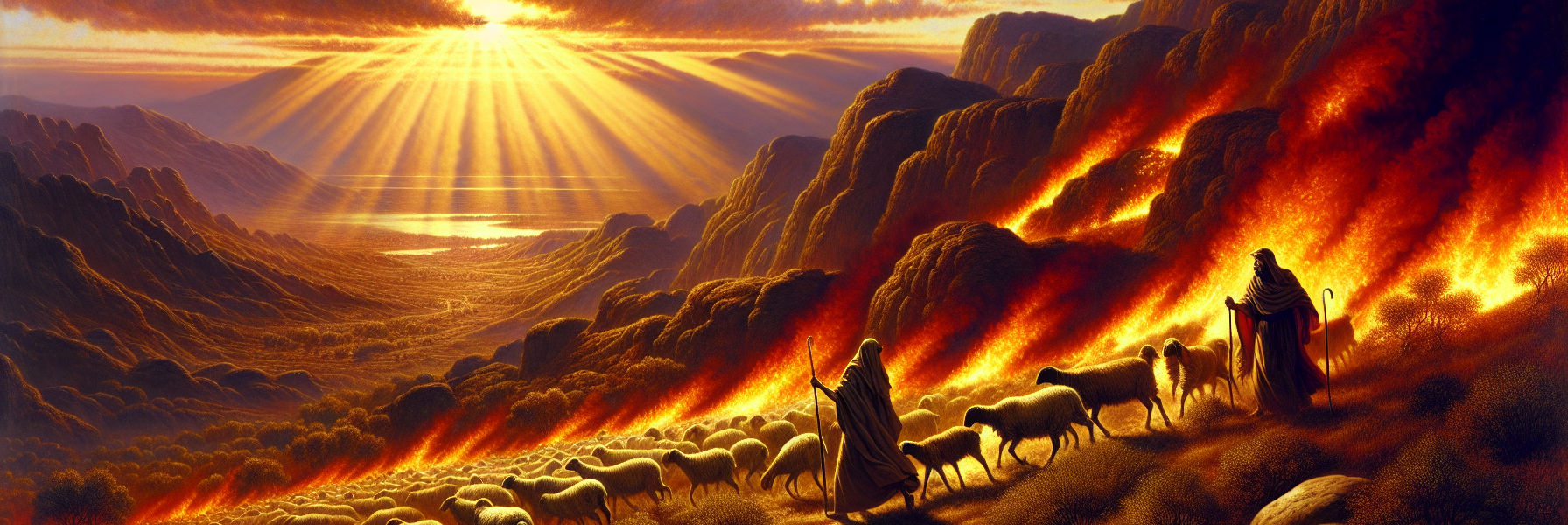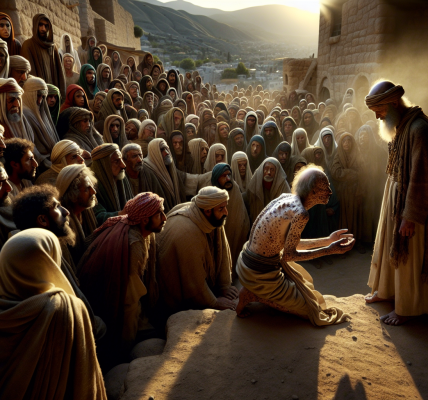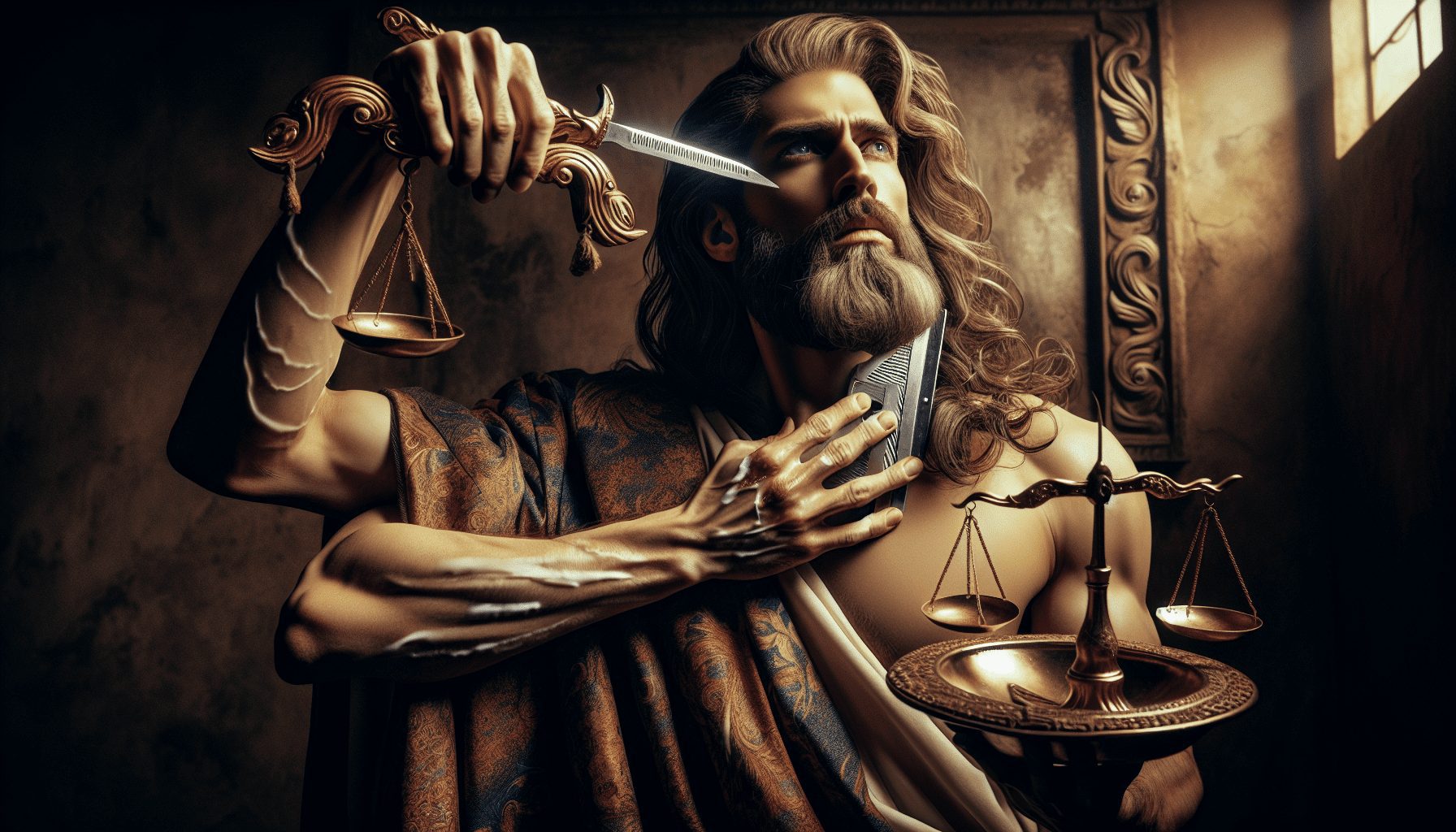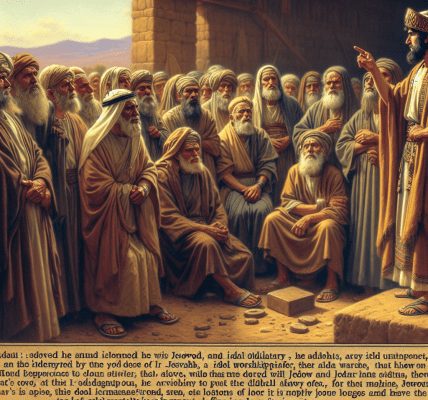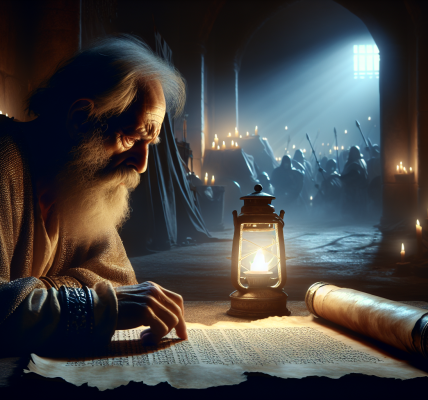**The Burning Bush: A Divine Encounter in the Wilderness**
The sun hung low over the wilderness of Midian, casting long shadows across the rugged terrain. The air was dry, carrying the faint scent of sage and dust. Moses, now a shepherd in the household of Jethro, his father-in-law, led his flock through the rocky hillsides, searching for sparse patches of grass. The once-prince of Egypt, now a humble exile, had spent forty years in this land—far from the grandeur of Pharaoh’s palace, far from the cries of his oppressed Hebrew brethren.
As he guided the sheep toward the western slopes of Horeb, the mountain of God, something unusual caught his eye. A bush, nestled among the rocks, was engulfed in flames—yet it did not burn away. The fire danced upon its branches, flickering with an unearthly glow, but the leaves remained fresh and green, untouched by destruction.
Moses stopped in his tracks, his breath catching in his throat. *What manner of fire is this?* He turned aside, drawn by the mystery, his sandals crunching against the gravel. “I must see this great sight,” he murmured, “why the bush is not consumed.”
Then, from the heart of the flames, a voice called to him—deep, resonant, and holy.
**”Moses, Moses!”**
Trembling, he answered, **”Here I am.”**
**”Do not come any closer,”** the voice commanded. **”Take off your sandals, for the place where you are standing is holy ground.”**
At once, Moses fell to his knees, fingers fumbling with the straps of his sandals. The earth beneath him was no longer ordinary—it was sanctified by the presence of the Almighty. The fire before him was no mere spectacle; it was the very glory of God.
Then the voice spoke again, rolling like thunder yet tender as a father’s whisper.
**”I am the God of your fathers—the God of Abraham, the God of Isaac, and the God of Jacob.”**
Moses hid his face, for he was afraid to look upon the Divine. The weight of the moment pressed upon him—this was no angel, no messenger, but the Lord Himself.
**”I have indeed seen the misery of my people in Egypt,”** God declared. **”I have heard them crying out because of their slave drivers, and I am concerned about their suffering. So I have come down to rescue them from the hand of the Egyptians and to bring them up out of that land into a good and spacious land, a land flowing with milk and honey—the home of the Canaanites, Hittites, Amorites, Perizzites, Hivites, and Jebusites.”**
Moses’ heart pounded. The memories of Egypt—the brick kilns, the crack of whips, the groans of his people—flooded his mind. But before he could dwell on them, the voice continued.
**”And now, the cry of the Israelites has reached me, and I have seen the way the Egyptians are oppressing them. So now, go. I am sending you to Pharaoh to bring my people the Israelites out of Egypt.”**
Moses’ blood ran cold. *Me?* The man who had fled in disgrace, the murderer, the failed deliverer? He lifted his face slightly, his voice trembling.
**”Who am I that I should go to Pharaoh and bring the Israelites out of Egypt?”**
The answer came swift and sure.
**”I will be with you. And this will be the sign to you that it is I who have sent you: When you have brought the people out of Egypt, you will worship God on this mountain.”**
Moses swallowed hard. The assurance was overwhelming, yet doubt gnawed at him. If he returned to Egypt, what would he say? Who would believe him?
**”Suppose I go to the Israelites and say to them, ‘The God of your fathers has sent me to you,’ and they ask me, ‘What is his name?’ Then what shall I tell them?”**
A profound silence followed, as though creation itself held its breath. Then, from the burning bush, the voice of the Lord resounded with eternal authority.
**”I AM WHO I AM. This is what you are to say to the Israelites: ‘I AM has sent me to you.'”**
The name echoed through the ages—Yahweh, the Self-Existent One, the Unchanging, the Eternal. He was the God who had made covenant with Abraham, who had sustained Jacob, and now He would deliver Israel.
**”Say to them, ‘The Lord, the God of your fathers—the God of Abraham, the God of Isaac, and the God of Jacob—has sent me to you.’ This is my name forever, the name by which I am to be remembered from generation to generation.”**
God then instructed Moses to gather the elders of Israel and tell them of His promise. They would listen, He assured, and together they would go before Pharaoh. But the king of Egypt would not let them go easily—not until God stretched out His mighty hand in judgment.
**”But I know that the king of Egypt will not let you go unless a mighty hand compels him. So I will stretch out my hand and strike the Egyptians with all the wonders that I will perform among them. After that, he will let you go.”**
Moses hesitated. What if they still did not believe him? What if his words fell on deaf ears?
God, in His patience, gave him a sign. He commanded Moses to throw his staff to the ground. When he did, the wooden rod twisted and writhed—transformed into a living serpent. Moses recoiled, but the voice commanded him again.
**”Reach out your hand and take it by the tail.”**
With trembling fingers, Moses obeyed, and the serpent became a staff once more.
**”This,”** said the Lord, **”is so that they may believe that the Lord, the God of their fathers, has appeared to you.”**
Yet another sign was given—Moses’ hand, when placed inside his cloak, turned leprous, white as snow, then was restored at God’s command. And if even these were not enough, water from the Nile, poured on dry ground, would turn to blood.
Still, Moses wavered. **”Pardon your servant, Lord. I have never been eloquent—I am slow of speech and tongue.”**
But the Lord answered, **”Who gave human beings their mouths? Who makes them deaf or mute? Who gives them sight or makes them blind? Is it not I, the Lord? Now go; I will help you speak and will teach you what to say.”**
Moses, overwhelmed, pleaded once more. **”Please, Lord, send someone else.”**
For a moment, the air grew heavy. Then, though displeased, the Lord in His mercy provided a solution.
**”What about your brother, Aaron the Levite? I know he can speak well. He is already on his way to meet you, and when he sees you, he will be glad in his heart. You shall speak to him and put words in his mouth; I will help both of you speak and will teach you what to do.”**
The encounter was drawing to a close. The fire still blazed, undiminished, a testament to God’s enduring presence. Moses knew there was no turning back. The God of his fathers had spoken, and His word would not return void.
With the staff of God in his hand and the promise of divine power, Moses turned his face toward Egypt. The deliverance of Israel had begun.
And though the road ahead would be fraught with peril, one truth remained unshaken: **”I AM WHO I AM”** would be with him.
